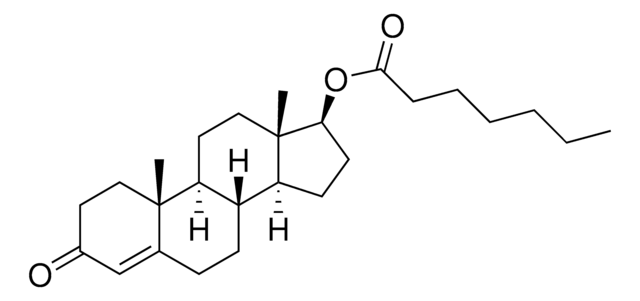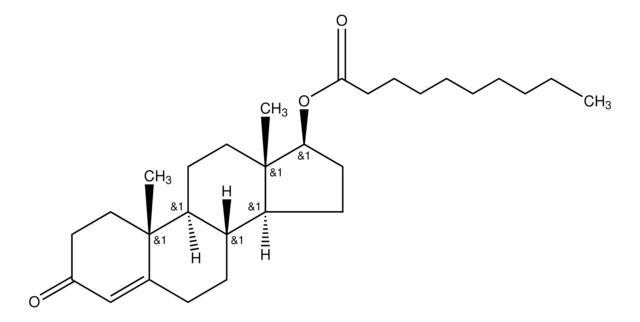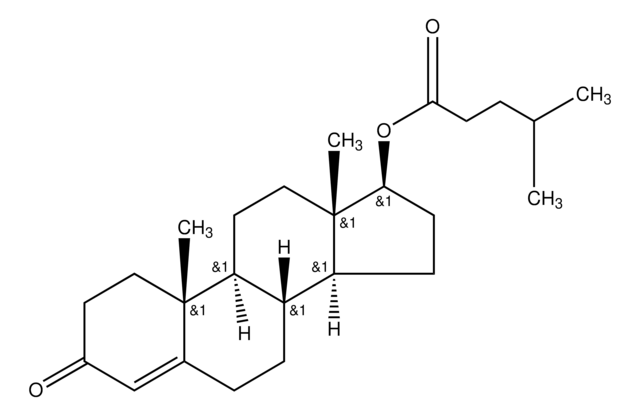推薦產品
等級
pharmaceutical primary standard
API 家族
testosterone
製造商/商標名
EDQM
藥物控制
regulated under CDSA - not available from Sigma-Aldrich Canada
應用
pharmaceutical (small molecule)
格式
neat
儲存溫度
−20°C
SMILES 字串
CCCCCCC(=O)O[C@H]1CC[C@H]2[C@@H]3CCC4=CC(=O)CC[C@]4(C)[C@H]3CC[C@]12C
InChI
1S/C26H40O3/c1-4-5-6-7-8-24(28)29-23-12-11-21-20-10-9-18-17-19(27)13-15-25(18,2)22(20)14-16-26(21,23)3/h17,20-23H,4-16H2,1-3H3/t20-,21-,22-,23-,25-,26-/m0/s1
InChI 密鑰
VOCBWIIFXDYGNZ-IXKNJLPQSA-N
基因資訊
human ... AR(367)
尋找類似的產品? 前往 產品比較指南
一般說明
This product is provided as delivered and specified by the issuing Pharmacopoeia. All information provided in support of this product, including SDS and any product information leaflets have been developed and issued under the Authority of the Issuing Pharmacopoeia. For further information and support please go to the website of the issuing Pharmacopoeia.
應用
Testosterone enantate EP Reference standard, intended for use in laboratory tests only as specifically prescribed in the European Pharmacopoeia.
包裝
The product is delivered as supplied by the issuing Pharmacopoeia. For the current unit quantity, please visit the EDQM reference substance catalogue.
其他說明
Sales restrictions may apply.
相關產品
產品號碼
描述
訂價
訊號詞
Danger
危險分類
Acute Tox. 4 Oral - Carc. 1B - Repr. 2
儲存類別代碼
6.1C - Combustible, acute toxic Cat.3 / toxic compounds or compounds which causing chronic effects
水污染物質分類(WGK)
WGK 3
閃點(°F)
Not applicable
閃點(°C)
Not applicable
客戶也查看了
Hanna M King et al.
Psychoneuroendocrinology, 37(3), 396-409 (2011-08-09)
Increasing evidence in humans and other animals suggests that testosterone (T) plays an important role in modulating emotion. We previously reported that T treatment in rhesus monkeys undergoing chemically induced hypogonadism results in increased watching time of videos depicting fights
J W Kim et al.
International journal of impotence research, 25(1), 29-33 (2012-09-14)
Several studies have suggested combination therapy with testosterone supplementation in patients not responding to PDE5 inhibitors. Considering the pathophysiological basis for testosterone supplementation, the present study aims to identify whether combination therapy allows persistence of treatment effect after testosterone discontinuation.
Jenny J Schulze et al.
The Journal of clinical endocrinology and metabolism, 96(11), 3440-3447 (2011-08-19)
The conspicuous interindividual differences in metabolism and urinary excretion of testosterone and its metabolites make it challenging to reveal testosterone doping. The variation in testosterone glucuronide excretion is strongly associated with a deletion polymorphism in the uridine diphosphate-glucuronosyltranferase (UGT) 2B17
Agnès Lacreuse et al.
Physiology & behavior, 106(2), 229-237 (2012-03-01)
The role of testosterone (T) in modulating cognitive function and emotion in men remains unclear. The paucity of animal studies has likely contributed to the slow progress in this area. In particular, studies in nonhuman primates have been lacking. Our
Akira Tsujimura et al.
Asian journal of andrology, 13(4), 558-562 (2011-04-05)
Androgens, the levels of which decrease with ageing, play many physiological roles in various organs. Testosterone deficiency syndrome (TDS) has received widespread attention in the last several years. First-line treatment for TDS should be testosterone replacement therapy (TRT), which is
我們的科學家團隊在所有研究領域都有豐富的經驗,包括生命科學、材料科學、化學合成、色譜、分析等.
聯絡技術服務







